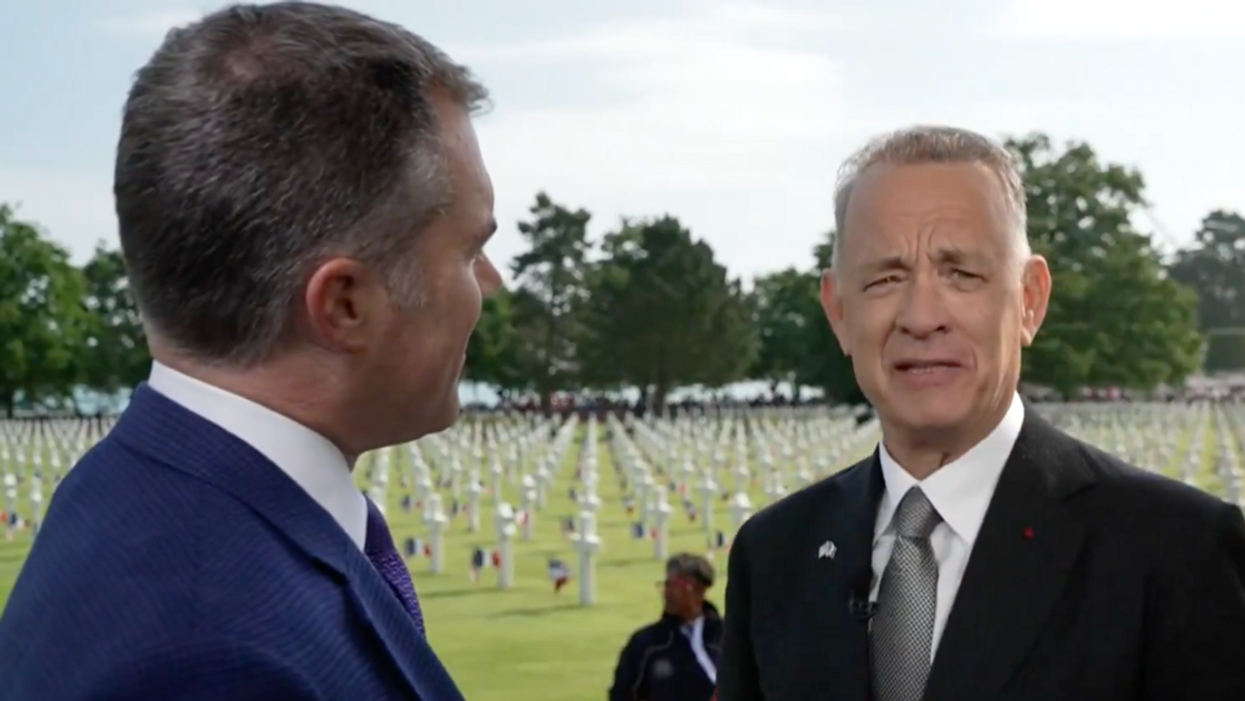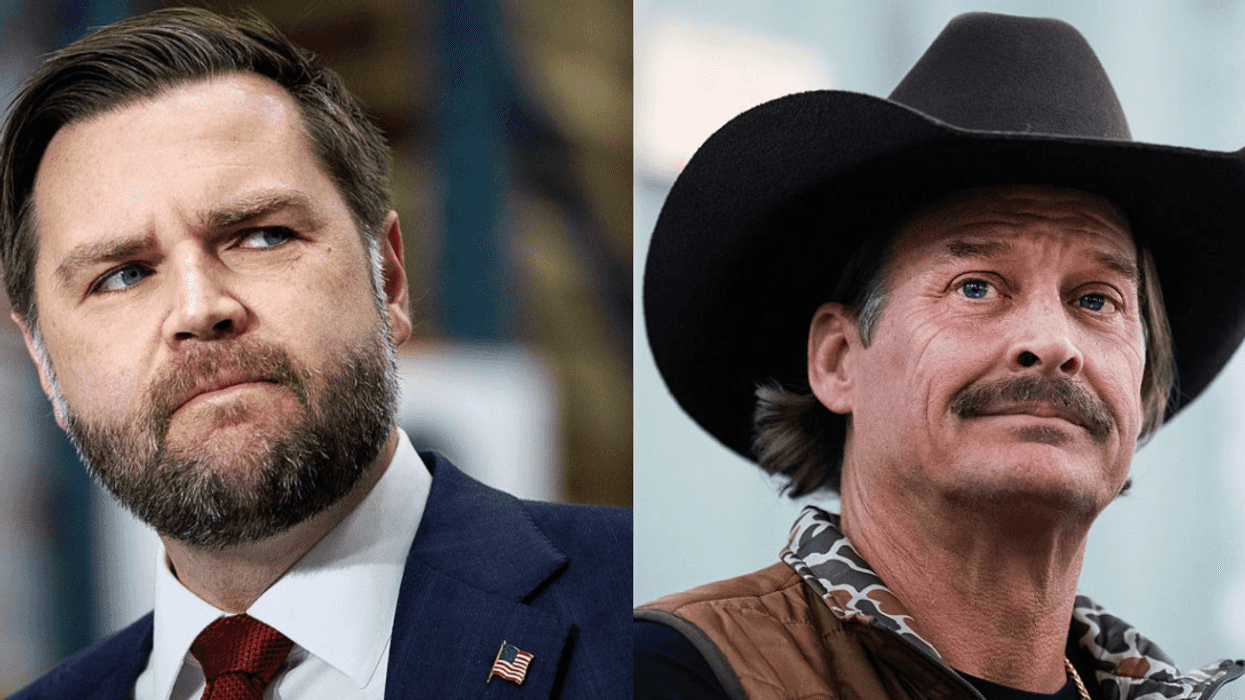Saving Private Ryan star Tom Hanks and the film's director Steven Spielberg were on hand for the 80th anniversary commemoration ceremony of D-Day in Normandy, France, and Hanks was praised for his statements about the heroism and legacy of the veterans.
The D-Day operation on June 6, 1944, united the land, air, and sea forces of the Allied armies in what became the largest amphibious invasion in military history. Codenamed Operation OVERLORD, this massive endeavor landed five naval assault divisions on the beaches of Normandy.
The Allied invasion of France on D-Day signified the beginning of the end for the Nazi regime and holds a significant place in the collective memory of Western democracies. The day's significance is all the more profound given the ongoing war in Ukraine, the first full-scale war on the European continent since the end of World War II.
Hanks issued the following remarks in an interview with MSNBC:
"We have a few men and women who I see as being 16, 17, 18, maybe 25 years old ... They might be in wheelchairs now but they're represented by everything that is here. Were it not for their choice to do the right thing 80 years ago, you and I would not be standing here right now."
"The day is going to come where the last veteran of World War II will go and perhaps that might be the last veteran of D-Day as well."
"When it happens, the good news is that their story will have been told by them because between TikTok and social media and grandkids and friends of the family, they are making sure they're sticking a microphone and camera in front of Pop Pop's face and say, 'Tell us what you did when you were a kid, Pop Pop!'
"And they do."
You can hear what Hanks said in the video below.
Below, you can see a video of Hanks and Spielberg among the ceremony's guests.
Tom Hanks And Steven Spielberg Attend D-Day Anniversary Commemoration Ceremony In Normandy, Francewww.youtube.com
Saving Private Ryan follows a group of soldiers assigned to retrieve Private Ryan (played by Matt Damon) after his three brothers are killed in action.
Screenwriter Robert Rodat conceived the idea for the movie after noticing sets of brothers among the names on a monument memorializing soldiers killed in American wars. He was also inspired by the true story of the four Niland brothers, detailed in Stephen E. Ambrose’s book D-Day June 6, 1944: The Climactic Battle of World War II.
The Niland brothers—Preston, Robert, Fritz, and Edward—all served in the American military during World War II. Preston and Robert were both killed during the Normandy invasion on D-Day. Edward was presumed dead until the war's end, although he survived as a prisoner of war in the Pacific Theater and lived until 1984.
Believing Fritz to be the only surviving Niland brother, the military ordered him home after informing him of his siblings’ deaths. In the film, after a harrowing mission to locate Ryan, the soldiers are frustrated by Ryan’s steadfast refusal to abandon his post, despite learning about his brothers' fates.
Saving Private Ryan ultimately won five Oscars, including Best Director for Spielberg, but lost the coveted Best Picture Award to Shakespeare in Love.
It is widely considered one of the best films of all time as well as an important milestone in filmmaking for its honest and brutal depiction of the horrors of World War II, contributing to a new wave of advocacy on behalf of those veterans who are still with us all these years later.
Many appreciated Hanks' remarks about one of modern history's most important events, as well as the role he played in one of the seminal films about the Second World War.
Among the event's attendees were King Charles and Queen Camilla of the United Kingdom. The royal couple visited the Ministry of Defence and participated in the Royal British Legion’s ceremony at the beachfront British Normandy Memorial in Ver-sur-Mer.
As reported by AP News, French President Emmanuel Macron honored eleven U.S. WWII veterans with France’s highest distinction, the Legion of Honor.
Among them was Christian Lamb, now 103, who was among the hundreds of thousands of military women who "worked behind the scenes in crucial non-combat roles such as codebreakers, ship plotters, radar operators and cartographers." Lamb said that on that historic day, she "really wanted [to do] anything that would help me to get … France back to the French."








 Roberto Schmidt/AFP via Getty Images
Roberto Schmidt/AFP via Getty Images





 u/pizzaratsfriend/Reddit
u/pizzaratsfriend/Reddit u/Flat_Valuable650/Reddit
u/Flat_Valuable650/Reddit u/ReadyCauliflower8/Reddit
u/ReadyCauliflower8/Reddit u/RealBettyWhite69/Reddit
u/RealBettyWhite69/Reddit u/invisibleshadowalker/Reddit
u/invisibleshadowalker/Reddit u/Wishnik6502/Reddit
u/Wishnik6502/Reddit u/kateastrophic/Reddit
u/kateastrophic/Reddit u/blking/Reddit
u/blking/Reddit u/SlagQueen/Reddit
u/SlagQueen/Reddit u/geezeslice333/Reddit
u/geezeslice333/Reddit u/meertaoxo/Reddit
u/meertaoxo/Reddit u/crystal_clear24/Reddit
u/crystal_clear24/Reddit u/stinkpot_jamjar/Reddit
u/stinkpot_jamjar/Reddit
 u/Bulgingpants/Reddit
u/Bulgingpants/Reddit
 @hackedliving/TikTok
@hackedliving/TikTok @hackedliving/TikTok
@hackedliving/TikTok @hackedliving/TikTok
@hackedliving/TikTok @hackedliving/TikTok
@hackedliving/TikTok @hackedliving/TikTok
@hackedliving/TikTok @hackedliving/TikTok
@hackedliving/TikTok @hackedliving/TikTok
@hackedliving/TikTok @hackedliving/TikTok
@hackedliving/TikTok @hackedliving/TikTok
@hackedliving/TikTok @hackedliving/TikTok
@hackedliving/TikTok
 @vanderjames/Instagram
@vanderjames/Instagram @vanderjames/Instagram
@vanderjames/Instagram @vanderjames/Instagram
@vanderjames/Instagram @vanderjames/Instagram
@vanderjames/Instagram @vanderjames/Instagram
@vanderjames/Instagram @vanderjames/Instagram
@vanderjames/Instagram @vanderjames/Instagram
@vanderjames/Instagram @vanderjames/Instagram
@vanderjames/Instagram @vanderjames/Instagram
@vanderjames/Instagram @vanderjames/Instagram
@vanderjames/Instagram